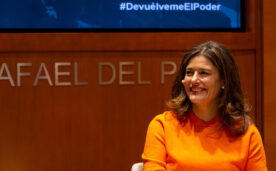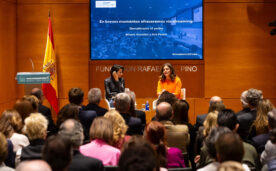Miriam González and Ana Pastor
Summary:
On 13 November 2019, Miriam González, a lawyer specialising in European Union Law and founder of the international movement "Inspiring girls", gave a conference at the Rafael del Pino Foundation entitled "Give me back my power: why liberal reform is urgent in Spain", on the occasion of the presentation of her book "Give me back my power because it is mine". For Miriam González, the concept of accountability is liberalism, although it has been understood very differently in different countries. The possibilities for reform in Spain, in this sense, are seen in a pessimistic light. However, when things are analysed area by area, what needs to be changed, some things are easy to change. Sometimes it is enough to open a website. All that is needed is political will. Unfortunately, in Spain it has become normalised not to be accountable when in many other countries this does not happen. Part of our problems stem from the Transition, because it was necessary to reach a consensus that would unite everyone by bringing together a series of de facto powers, which means accumulating power. One of the clearest examples is the closed electoral lists. But things that were valid then are no longer valid today. Therefore, it is no good to remain immobile after four decades. This leads to a vicious circle in which politicians concentrate power. They then become unaccountable and citizens become less empowered to change things and less in control of what politicians are doing. So that concentration of power has expanded, for example, through manipulations of public procurement, or through legislation that is not transparent and is excessive. So we need to do something as easy as changing these trends, start putting issues on the table and see how we are going to adapt the system from the inside so that it does not break down from the outside. Many of the things we can do to improve our system are easy and simple. The problem is that people are taking things for granted that are not. In the UK, for example, there is an ethics committee that you have to go through, which is not the case in Spain. If the committee detects a conflict of interest, the politician is removed. In Spain this can also be done, but there is a lack of political will. The security, the bodyguards, the pomp that is created in Spain around politicians, those signs of cars and official houses, those huge groups of advisors not only have an economic cost. They also have a cost in terms of power because they distance the politician from the citizens. In other countries, this tends to happen in the front line of politics and this leads them to distance themselves from it. In that line, sometimes you need people to tell you whether you are doing it right. What is absolutely unusual is what happens in Spain, where this situation is not only in the first line of politics, but also in the second, in the third, in the regional and local authorities. In many places there are corrupt politicians, who are where they are because people vote for them. But, in the end, the responsibility for this lies with the citizens, who sometimes become accomplices, who are often unaware of the importance of their vote. Now, if the citizens of other countries had a political system like Spain's, the cases of corruption that occur in Spain would also be happening. The problem, therefore, lies with the system. It is unacceptable that a large number of corruption cases have arisen, many of which have gone through the justice system, and that justice continues to be slow and has not been reformed when we have had many years to do so. Instead of changing the system, we continue with it as it was. The same applies to business competition. This discussion on the various reforms is something that should be in the interest of all of us. We are all interested in continuing with the constitutional system, that the country prospers, that we leave future generations a better country than the one we have received from previous generations. But we have not managed to generate this popular clamour because of this great accumulation of power. The Spanish Constitution must be reformed, but it is a discussion that must be carried out in phases. The first phase is a technical phase, which consists of looking at what is being done elsewhere and comparing it with what we are doing. But not everything is about reforming the Magna Carta. For parliamentarians to go to their constituencies every week, to meet their voters, you don't have to reform the Constitution. Nor is it necessary to make public procurement oversight bodies transparent. The same applies to opening a website for legislative consultations. These things, however, are not being done. The most worrying thing is the number of paid politicians at all levels of government. They are also the ones who appoint people to public companies. Then there are also the foundations. Then there are all the temporary and interim staff. The total figure may be 200,000 people, but there is no clear way of knowing this due to a lack of transparency. In other countries, too, politicians feel a media pressure that is not felt in Spain. Politicians in other places talk more frequently to the media. In Spain, this pressure is only exerted by a few journalists and media, and politicians hardly respond to this pressure. In any case, there is a growing trend in the United States and the United Kingdom, for example, to limit journalists' right of expression. As far as feminism is concerned, the trend is that things start in the United States, reach Europe and, at some point, reach Spain. The discussion is eight or ten years late in our country. Feminism means that we are all equal, regardless of chromosomes, so it cannot be that half of the population has less power than it is entitled to. Finally, he pointed out that liberalism is not necessarily centrist. One of the dramas in Spain was the rightward movement of Ciudadanos. That causes the failure of Ciudadanos. Spain is better if it has a liberal option, but it is much better if those of us who share those liberal values can see that space for consensus.
The Rafael del Pino Foundation is not responsible for the comments, opinions or statements made by the people who participate in its activities and which are expressed as a result of their inalienable right to freedom of expression and under their sole responsibility. The contents included in the summary of this conference are the result of the debates held at the meeting held for this purpose at the Foundation and are the responsibility of their authors.
The Rafael del Pino Foundation is not responsible for any comments, opinions or statements made by third parties. In this respect, the FRP is not obliged to monitor the views expressed by such third parties who participate in its activities and which are expressed as a result of their inalienable right to freedom of expression and under their own responsibility. The contents included in the summary of this conference are the result of the discussions that took place during the conference organised for this purpose at the Foundation and are the sole responsibility of its authors.









